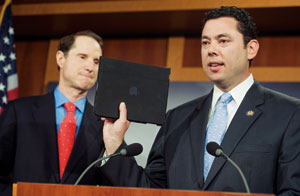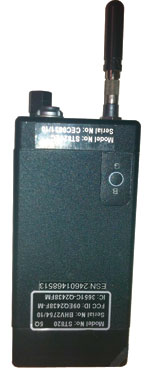CQ WEEKLY – IN FOCUS
Corrected Nov. 8, 2011 – 7:28 p.m.
Rethinking Warrants in a Wireless Age
By Gail Sullivan, CQ Staff
The last time the Supreme Court addressed law enforcement use of modern electronic tracking devices was in a 1983 case involving a beeper. Law enforcement agents had placed the device inside a container of chemicals used to make methamphetamine, allowing them to track the approximate location of the container as they followed the suspect over a single 100-mile car trip to his meth lab.

|
||
|
Had police just followed the car without using a beeper, nobody would have argued that they needed a warrant. Under standards established by the Supreme Court, people generally have no “reasonable expectation of privacy” in things they do in public.
The question was whether the beeper changed anything. Was it so intrusive that authorities needed to show cause for using it and obtain a warrant from a judge?
The answer was no. The court ruled in United States v. Knotts that, electronics notwithstanding, police were simply keeping track of a person driving a car on public streets. But the court also warned that its decision should not be read to sanction “24-hour surveillance” using “dragnet-type law enforcement practices.”
In that same year, the military declassified for civilian use a technology that would make the beeper look primitive, the Global Positioning System. The GPS device would ultimately give law enforcement agents much greater precision in remotely monitoring a suspect’s movement, sometimes for weeks or months at a time.
Is GPS a step too far? That’s the question in United States v. Jones, a case set for argument on Tuesday, Nov. 8.
Is the GPS device merely a more efficient means of tailing a suspect? Or is it so invasive and sophisticated that there should be limits on its use by law enforcement?
More precisely, the question in United States v. Jones is: Does the warrantless installation and use of a GPS tracking device to monitor movement of a vehicle on public streets constitute an unlawful “search” under the Fourth Amendment?
The case comes from the District of Columbia. In 2004, Antoine Jones, co-owner of a nightclub, became a target in a drug ring investigation. Without a valid warrant, police attached a GPS device to Jones’ car while it was parked in a public lot and used the device to track his movements for a month. No drugs were found in Jones’ possession, nor was there proof he was involved in any drug transactions. Relying heavily on GPS data showing that Jones repeatedly visited a house where agents later found a large stash of drugs, a trial court convicted Jones of conspiring to distribute cocaine. The U.S. Court of Appeals for the D.C. Circuit reversed the conviction, finding that the government’s use of GPS to track Jones’ car without a valid warrant did indeed violate the Fourth Amendment. The government appealed the case to the Supreme Court.
Even among those who acknowledge the usefulness of GPS as a law enforcement tool, there is concern that unsupervised GPS surveillance could lead to abuse of power by government agents to track citizens’ activities without having to prove to a judge that the surveillance is justified.
Groups as diverse as the American Civil Liberties Union, the Center for Democracy and Technology (joined by the inventor of GPS technology Roger L. Easton), the Gun Owners of America and the libertarian CATO Institute have filed amicus briefs in favor of treating GPS surveillance as a search requiring a warrant. They point to the fact that GPS devices allow law enforcement agents to engage in continuous surveillance from remote locations and to gather and store comprehensive, precise information about citizens’ daily activities in a searchable format.
The brief to the court on Jones’ behalf expressed concern that “GPS technology . . . enables seamless monitoring of entire networks of individuals, political associations, even entire communities.” On the other side of the argument are those who point out that GPS is a useful tool for regular citizens and law enforcement alike and that regulating its use would impede criminal investigations. In the absence of evidence of widespread abuse, they say requiring a warrant for GPS surveillance is unnecessary.
Rethinking Warrants in a Wireless Age
Under the legal standard established by the court, the warrant requirement depends on whether Jones had an expectation of privacy that society is prepared to recognize as “reasonable.” A search in a private home, for example, meets that standard. But in a world where information recorded by everyday technology — cellular phones, GPS, Facebook, subway cards — can reveal where you are and what you’re doing, determining when an expectation of privacy is reasonable is more complicated.
Technology calls into question traditional legal distinctions between activities done behind closed doors and things held out for public view. Digital-age devices can monitor a person’s precise movements around the clock, storing data for use in digital pattern analysis, and allowing police to gather far more information than they could with older surveillance technology.
Referencing the “dragnet” warning from the beeper case, the D.C. Circuit distinguished the prolonged surveillance of Jones from those facts and reached its own conclusion, that GPS is more revealing. Jones had no reasonable expectation of privacy in a single trip on a public road, the court said. But using GPS to monitor his movements continuously for weeks was unreasonable because the “whole of one’s movements over the course of a month . . . reveals far more than the individual movements it comprises.”
“Repeated visits to a church, a gym, a bar, or a bookie tell a story not told by any single visit . . . a single trip to a gynecologist’s office tells little about a woman, but that trip followed a few weeks later by a visit to a baby-supply store tells a different story,” Judge Douglas Ginsburg wrote.
The defense brief to the court echoes the appellate court’s concerns about prolonged GPS surveillance enabling the government to compile information about citizens’ daily activities and movements. But it also argues that GPS surveillance is “search” when conducted for any amount of time because of the uniquely intrusive nature of GPS technology. While a person exposes himself to visual observation when on public roads, he does not “knowingly offer GPS data for public viewing,” Jones’ lawyers argue. Enhanced techniques previously considered by the court “didn’t involve the features that make GPS surveillance a search,” they say.
In its brief, the Department of Justice points out that law enforcement used GPS to monitor Jones’ travel only on public streets where there is no reasonable expectation of privacy and therefore no warrant requirement.
It rejects the appellate court’s distinction between the prolonged and more technologically sophisticated surveillance of Jones and the tracking in the beeper case, arguing that one’s “reasonable expectation of privacy in activities exposed to public view does not depend on the total quantity of information collected.”
Modern Challenge

|
||
|
Whether or not GPS surveillance should be considered a Fourth Amendment “search” requiring a warrant is not the only subject of debate. There is also the question of whether the court should abandon its existing Fourth Amendment analytical framework in favor of an approach better suited to contemporary technology. Some argue that a departure from precedent is justified because modern technology has erased much of the distinction between protected private spaces and public places.
Others, including George Washington University law professor and Fourth Amendment expert Orin Kerr, argue that the court need not depart from its “search” standard, and that doing so would probably result in an approach too vague for courts and law enforcement to consistently apply. The Department of Justice brief to the court similarly argues that if the court were to adopt the approach of the appellate court, “law enforcement officers could not predict when their observations of public movements would yield a larger pattern and convert legitimate short-term surveillance into a search,” and it could “deeply unsettle Fourth Amendment law and cloud the vitality of a host of standard practices.”
Kerr argues that regardless of how the court rules, Congress should enact a federal privacy statute to deal with such situations.
Legislation introduced this summer by Oregon Democratic Sen.
Rethinking Warrants in a Wireless Age
Meanwhile, there’s a largely unregulated repository of information about the daily activities of average citizens and an ever-growing concern that Congress and the courts have failed to keep pace with the technologies used to gather it.
FOR FURTHER READING: Privacy committee, CQ Weekly, p. 846; electronic data privacy, 2010 CQ Weekly, p. 1493; electronic surveillance authority extended (PL 110-261), 2008 CQ Weekly, p. 3280.
First posted Nov. 5, 2011 12:04 p.m.
Correction
Corrected to correctly describe the scope of the proposed Wyden-Chaffetz GPS Act. The bill does cover use GPS surveillance technology by private citizens.